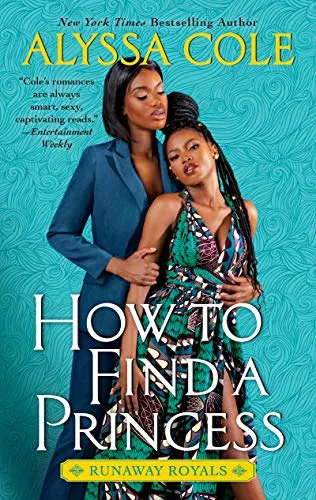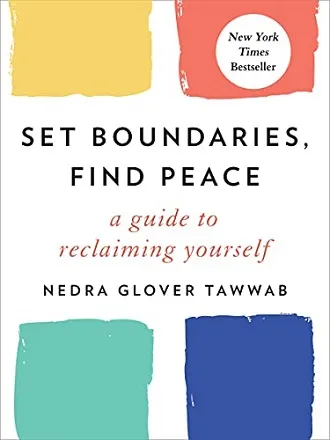
Happy Endings For Codependents, Two Ways
I didn’t intend to read two books about codependency at the same time, but sometimes the universe conspires against me (and hits me over the head with a theme so that I can’t ignore it) — and that’s what happened when I found myself toggling back and forth between How To Find A Princess by Alyssa Cole and Set Boundaries, Find Peace by Nedra Glover Tawwab. It was almost too much, to be perfectly honest, not to mention extremely rude! How dare each of these books call me out on my long-running, work-in-progress, “I am trying but I still have a long way to go” tendencies?! I am happy to report that, despite the initial sting, each of these books has a happy ending for anyone who, like me, struggles with codependency.
What is codependency, you ask? I like this description from Codependency for Dummies (a really good resource, by the way): “[Codependents’] lives revolve around someone else — especially those they love. Their loved ones preoccupy their thoughts, feelings, and conversations. Like jumpy rabbits, they react to everything, put aside what they need and feel, and try to control what they can’t.”
I myself am a born-and-bred people-pleaser, and just recently had to make myself a giant note next to my desk that reads: “What are we solving for that is NOT feelings?” Because always, my first stop in breaking down any problem is: how will someone feel about this? It’s good to consider your fellow humans; it’s less good to be entirely ruled by how you imagine people may react to something, and to design your actions to produce the least amount of feelings possible.

This is beautifully captured in the opening of How To Find A Princess, in which our heroine Makeda finds her girlfriend on the stairs of their building, bag packed, leaving their apartment and their relationship for good. What does our heroine do, you ask? Obviously she wonders if her soon-to-be-ex packed her suitcase with the rolling method, and offers to repack it, and barring that to carry it out to the car. Fellow readers, you may laugh or guffaw in shock, but this is almost exactly a scene out of a past breakup that I had. I’m not proud of it, and I believe I have grown since then, but let me tell you: this shit is real! (And while we are friends, I don’t think I’ve told Alyssa that story, so clearly it must have happened to others??)
Then there’s the offhand description of Makeda as a “sentient welcome mat” by a customer at her grandmother’s B&B. While her grandmother righteously defends her, the reality is that I too have been there and that shoe fits; and as I have learned, even the most well-intentioned person will walk on you if you keep throwing yourself in front of them. Figuring out why we throw ourselves in the first place is sometimes very obvious to us, and other times more mysterious, but the patterns are there if we look. The next step is Not Doing That, naturally; easier said than done, surprisingly. It’s a long road from believing that your job is making everyone around you feel good, nay, The Best!, all the time, to recognizing that you have to be your own number one priority — and sometimes that means saying no.
Luckily, Nedra Glover Tawwab is here to help. It’s one thing to realize that you’ve got codependent tendencies and start recognizing them as they happen — and let me say from experience, just developing that awareness is a huge amount of work. It’s another thing entirely to know what to do about it, as Makeda finds out. The answer, as tempting as it is, isn’t to do nothing for anyone, or build a tower around yourself so no one can ever get close enough to need anything from you ever again, thanks very much. The answer is to figure out a) what boundaries are, b) which ones you need, c) tell people about them, and d) persist. It may seem simple in theory, but it’s definitely not easy, especially when you bring all those learned behaviors, traumas, and preexisting codependent relationships into the mix.
Let’s take a moment to do part a, because while “having good boundaries” gets tossed around regularly as a concept, it’s not often explained — and it’s not necessarily obvious to some of us! Psychology Today breaks it down: “A boundary is an invisible line you draw around yourself to identify what is acceptable behavior, and what is unacceptable behavior.” There are lots of different kinds: physical, mental, emotional, moral, sexual…the list goes on. They also aren’t the same things as walls: “The beauty of boundaries is that they are fluid and ever-evolving…A critical part of a healthy psyche is deciding on the right tension for your life.”

Ok, so now we know that; what next? Set Boundaries, Find Peace is here for you. Tawwab breaks this process down one step at a time, one scenario at a time, whether it’s figuring out how to tell someone that they can’t use your new car, creating distance from an addict, or making holidays with family bearable despite the fact that your family members will probably never change their irksome ways. She also has some real — really, really real — talk about the feelings of guilt that will come, the inevitability of backsliding, and what years of being a therapist have taught her about implementing boundaries when you’re not used to it. Trust that you will be underlining, dog-earing, and taking notes; this is the kind of book you may well want your own copy of.
Alyssa Cole captured the beginning stages of this process beautifully in How To Find A Princess; Makeda recognizes that she has to change, and then starts throwing emotional spaghetti at the wall (and at Bezneria). Some of it sticks, some of it doesn’t, and all of it’s a journey — and that’s exactly right. There is an on-going, possibly never-ending path from codependency to emotional self-reliance and resilience. But Makeda is on that path, and so am I, and if you want both a kick in the pants in the form of a how-to and a hilarious, thought-provoking, sexy-as-hell example of what this looks like in practice, replicating my serendipitous read-along is a great place to start. Grab yourselves copies of Set Boundaries, Find Peace and How To Find A Princess, buckle up, and know that we’re in this together — I’m rooting for you!









